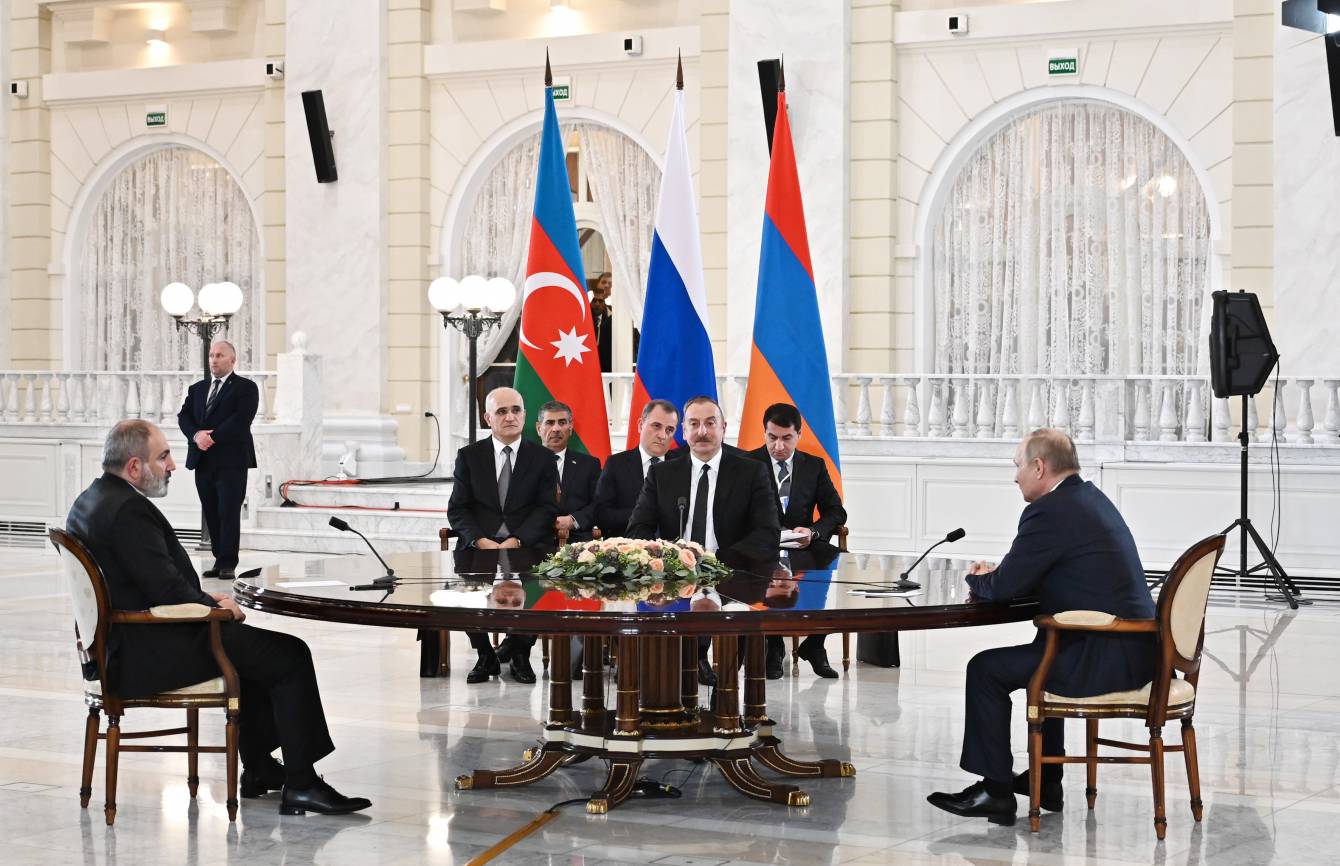Russian President Vladimir Putin hosted Azerbaijan's President Ilham Aliyev and Armenian Prime Minister Nikol Pashinyan for a meeting in the Black Sea coastal city of Sochi on Monday where the two leaders expressed mutual respect for sovereignty, territorial integrity and inviolability of borders.
In a one-on-one meeting with Putin earlier in the day, President Aliyev called for normalizing relations between Azerbaijan and Armenia.
“The Karabakh conflict has already been consigned to history. It was resolved two years ago, so there is practically nothing to discuss in this context. The normalization of Azerbaijani-Armenian relations is a format that, of course, requires very serious steps,” President Aliyev was quoted by his press service as saying.
“Azerbaijan put forward five basic principles relatively recently, based on which the relations between Azerbaijan and Armenia should be normalized. These are the fundamental principles of international law, and I think that normalization can be achieved on this basis,” he added.
In Sochi, President Aliyev once again voiced Azerbaijan’s final position on the issue, which accepts no status for the country's Karabakh region and designates ethnic Armenians living there as citizens of Azerbaijan.
In a joint statement signed after the Russian-mediated talks, Aliyev and Pashinyan agreed to refrain from using force and resolving all issues solely on the basis of the mutual recognition of sovereignty, territorial integrity and inviolability of borders under the UN Charter and the Alma-Ata Declaration of 1991. They also underlined the importance of active preparations for the conclusion of a peace agreement for guaranteeing sustainable and lasting peace in the region.
Both sides agreed to maintain a positive atmosphere between the two countries for a dialogue between representatives of the public, expert communities, and religious leaders with Russian assistance. In addition, the parties said they would establish trilateral inter-parliamentary contacts in order to strengthen confidence between the two countries.
The document contained no paragraph about the Karabakh region and its so-called “status”.
“I have to say quite frankly that not everything has been agreed upon. Some things had to be removed from the text previously worked out at the level of specialists. However, I do agree with the overall assessment that the meeting was useful and that it creates the conditions for further steps towards resolving the situation as a whole,” President Putin said at the trilateral meeting, according to the Kremlin.
On Tuesday, the Federation Council of Russia kicked off consultations to establish trilateral inter-parliamentary contacts with Azerbaijan and Armenia. According to Baku-based Caliber news agency, Vice Speaker of the Federation Council Konstantin Kosachev said this task would be fulfilled by using the mechanisms of bilateral inter-parliamentary commissions with Baku and Yerevan.
Armenia and Azerbaijan had been locked in one of the world’s most protracted conflicts for nearly three decades. Following the Soviet Union’s dissolution in 1991, Armenia launched a full-blown military campaign against Azerbaijan, marking the longest and deadliest war in the South Caucasus region. The bloody war lasted until a ceasefire in 1994 and saw Armenia occupying 20 percent of Azerbaijan’s internationally recognized territories. Over 30,000 Azerbaijanis were killed, and one million were expelled from those lands in a brutal ethnic cleansing policy conducted by Armenia.
On September 27, 2020, the decades-old conflict between Armenia and Azerbaijan took a violent turn after Armenia’s forces deployed in the occupied Azerbaijani lands shelled military positions and civilian settlements of Azerbaijan. During the counter-attack operations that lasted 44 days, Azerbaijani forces liberated over 300 settlements, including the cities of Jabrayil, Fuzuli, Zangilan, Gubadli, and Shusha, from nearly 30-year-long illegal Armenian occupation. The war ended in a tripartite statement signed on November 10, 2020, by Armenia, Azerbaijan, and Russia. Under the statement, Armenia also returned the occupied Aghdam, Kalbajar, and Lachin districts to Azerbaijan.
In March 2022, Azerbaijan submitted a proposal containing basic principles for the establishment of mutual relations with Armenia. The principles were centered on mutual recognition of respect for the sovereignty and territorial integrity; mutual confirmation of the absence of territorial claims against each other; obligation to refrain from undermining the security of each other, from the threat or use of force; delimitation and demarcation of the state border, and unblocking of the transportation and other communications in the region.







 Armenian sappers commenced on Monday mine-clearance operations in the territories adjacent to the Saint Mary Church in village of Voskepar (Armenia...
Armenian sappers commenced on Monday mine-clearance operations in the territories adjacent to the Saint Mary Church in village of Voskepar (Armenia...
 Russian Foreign Minister Sergei Lavrov has reasserted that Moscow has no intentions to stop the fighting in Ukraine, even if peace talks commence.
Russian Foreign Minister Sergei Lavrov has reasserted that Moscow has no intentions to stop the fighting in Ukraine, even if peace talks commence.
 Iran has refuted reports of alleged damage to Shimon Peres Negev Nuclear Research Centre located southeast of Dimona, Israel, during the recent air...
Iran has refuted reports of alleged damage to Shimon Peres Negev Nuclear Research Centre located southeast of Dimona, Israel, during the recent air...
 Iran’s Foreign Minister, Hossein Amir-Abdollahian, has labeled a foiled Israeli drone attack in certain parts of the country as a "failure" for Isr...
Iran’s Foreign Minister, Hossein Amir-Abdollahian, has labeled a foiled Israeli drone attack in certain parts of the country as a "failure" for Isr...



